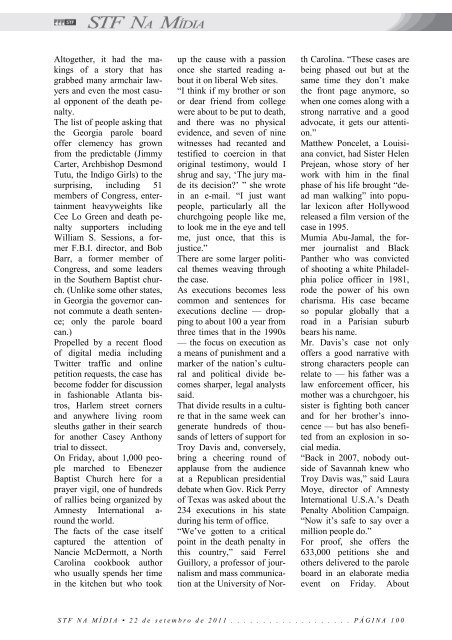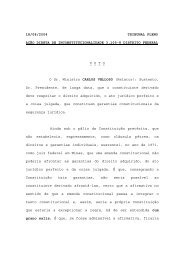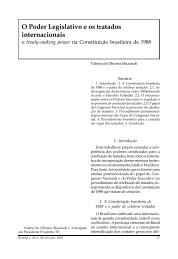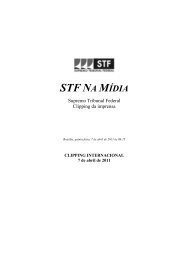STF NA MÍDIA
STF NA MÍDIA
STF NA MÍDIA
Create successful ePaper yourself
Turn your PDF publications into a flip-book with our unique Google optimized e-Paper software.
Altogether, it had the makings<br />
of a story that has<br />
grabbed many armchair lawyers<br />
and even the most casual<br />
opponent of the death penalty.<br />
The list of people asking that<br />
the Georgia parole board<br />
offer clemency has grown<br />
from the predictable (Jimmy<br />
Carter, Archbishop Desmond<br />
Tutu, the Indigo Girls) to the<br />
surprising, including 51<br />
members of Congress, entertainment<br />
heavyweights like<br />
Cee Lo Green and death penalty<br />
supporters including<br />
William S. Sessions, a former<br />
F.B.I. director, and Bob<br />
Barr, a former member of<br />
Congress, and some leaders<br />
in the Southern Baptist church.<br />
(Unlike some other states,<br />
in Georgia the governor cannot<br />
commute a death sentence;<br />
only the parole board<br />
can.)<br />
Propelled by a recent flood<br />
of digital media including<br />
Twitter traffic and online<br />
petition requests, the case has<br />
become fodder for discussion<br />
in fashionable Atlanta bistros,<br />
Harlem street corners<br />
and anywhere living room<br />
sleuths gather in their search<br />
for another Casey Anthony<br />
trial to dissect.<br />
On Friday, about 1,000 people<br />
marched to Ebenezer<br />
Baptist Church here for a<br />
prayer vigil, one of hundreds<br />
of rallies being organized by<br />
Amnesty International a-<br />
round the world.<br />
The facts of the case itself<br />
captured the attention of<br />
Nancie McDermott, a North<br />
Carolina cookbook author<br />
who usually spends her time<br />
in the kitchen but who took<br />
up the cause with a passion<br />
once she started reading a-<br />
bout it on liberal Web sites.<br />
“I think if my brother or son<br />
or dear friend from college<br />
were about to be put to death,<br />
and there was no physical<br />
evidence, and seven of nine<br />
witnesses had recanted and<br />
testified to coercion in that<br />
original testimony, would I<br />
shrug and say, ‘The jury made<br />
its decision?’ ” she wrote<br />
in an e-mail. “I just want<br />
people, particularly all the<br />
churchgoing people like me,<br />
to look me in the eye and tell<br />
me, just once, that this is<br />
justice.”<br />
There are some larger political<br />
themes weaving through<br />
the case.<br />
As executions becomes less<br />
common and sentences for<br />
executions decline — dropping<br />
to about 100 a year from<br />
three times that in the 1990s<br />
— the focus on execution as<br />
a means of punishment and a<br />
marker of the nation’s cultural<br />
and political divide becomes<br />
sharper, legal analysts<br />
said.<br />
That divide results in a culture<br />
that in the same week can<br />
generate hundreds of thousands<br />
of letters of support for<br />
Troy Davis and, conversely,<br />
bring a cheering round of<br />
applause from the audience<br />
at a Republican presidential<br />
debate when Gov. Rick Perry<br />
of Texas was asked about the<br />
234 executions in his state<br />
during his term of office.<br />
“We’ve gotten to a critical<br />
point in the death penalty in<br />
this country,” said Ferrel<br />
Guillory, a professor of journalism<br />
and mass communication<br />
at the University of North<br />
Carolina. “These cases are<br />
being phased out but at the<br />
same time they don’t make<br />
the front page anymore, so<br />
when one comes along with a<br />
strong narrative and a good<br />
advocate, it gets our attention.”<br />
Matthew Poncelet, a Louisiana<br />
convict, had Sister Helen<br />
Prejean, whose story of her<br />
work with him in the final<br />
phase of his life brought “dead<br />
man walking” into popular<br />
lexicon after Hollywood<br />
released a film version of the<br />
case in 1995.<br />
Mumia Abu-Jamal, the former<br />
journalist and Black<br />
Panther who was convicted<br />
of shooting a white Philadelphia<br />
police officer in 1981,<br />
rode the power of his own<br />
charisma. His case became<br />
so popular globally that a<br />
road in a Parisian suburb<br />
bears his name.<br />
Mr. Davis’s case not only<br />
offers a good narrative with<br />
strong characters people can<br />
relate to — his father was a<br />
law enforcement officer, his<br />
mother was a churchgoer, his<br />
sister is fighting both cancer<br />
and for her brother’s innocence<br />
— but has also benefited<br />
from an explosion in social<br />
media.<br />
“Back in 2007, nobody outside<br />
of Savannah knew who<br />
Troy Davis was,” said Laura<br />
Moye, director of Amnesty<br />
International U.S.A.’s Death<br />
Penalty Abolition Campaign.<br />
“Now it’s safe to say over a<br />
million people do.”<br />
For proof, she offers the<br />
633,000 petitions she and<br />
others delivered to the parole<br />
board in an elaborate media<br />
event on Friday. About<br />
S T F N A M Í D I A • 2 2 d e s e t e m b r o d e 2 0 1 1 . . . . . . . . . . . . . . . . . . . P Á G I N A 1 0 0
















